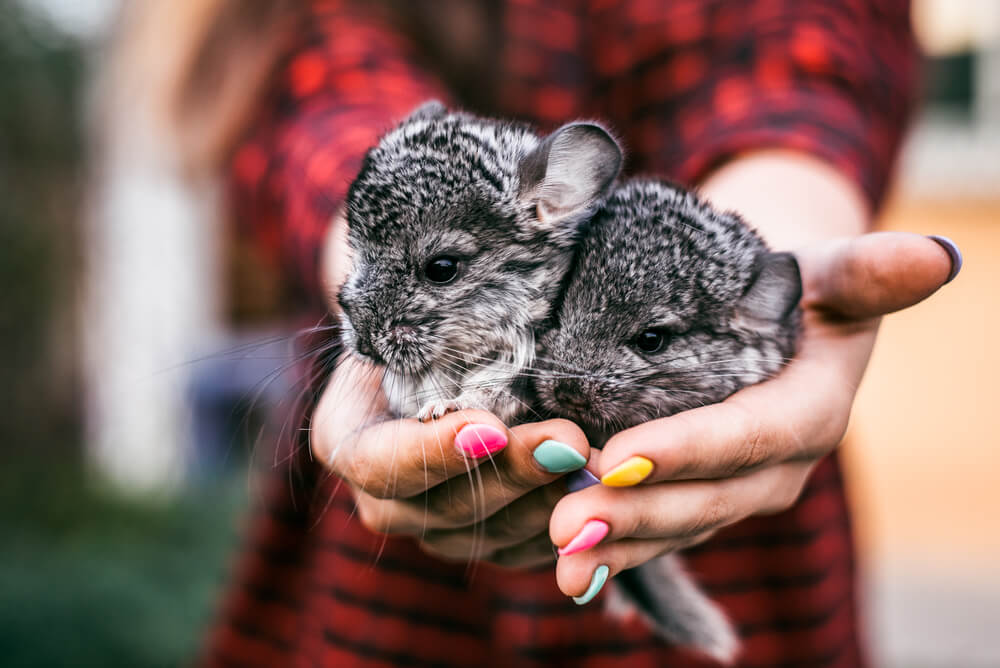Chinchillas are social animals that need interactions with people and other chinchillas to be happy. They thrive when they feel loved and cared for, but they can become stressed when they feel isolated.
They are also very curious and will frequently try to explore their environment.
Chinchillas need access to space to be able to run around, play, and explore their surroundings safely.
Leaving your chinchilla alone for long periods or leaving them in an enclosure that is not large enough can cause this stress and anxiety to build up until it manifests itself as separation anxiety.
If you have a chinchilla, leaving your pet alone for extended periods may seem like an inevitable problem that comes with having a pet.
However, there are things you can do before leaving your pet and other things you should avoid so you don’t end up creating more problems than you think you have.
Read on to learn more about what causes separation anxiety in chinchillas, how it manifests itself, and how to prevent it from happening if it happens to your pet at home.
How long can I leave my chinchilla alone?
Chinchillas are social animals that need interaction with people and other chinchillas to be happy. They thrive when they feel loved and cared for, but they can become stressed when they feel isolated.
Chinchillas also need access to space to be able to run around, play, and explore their surroundings safely.
Leaving your chinchilla alone for long periods or leaving them in an enclosure that is not large enough can cause this stress and anxiety to build up until it manifests itself as separation anxiety.
Chinchillas should not be left alone for more than 3 hours without supervision (more if you’re going out of town), but some may need more frequent supervision depending on the individual animal.
How can I make my chinchilla less lonely?
One of the best ways to prevent separation anxiety is by providing your chinchilla with a companion.
Ask your friends and family members if they have any unwanted, rescued animals in need of a home.
If you have a rescue, find one that is appropriate for your pet’s size and needs.
Sometimes, people who are giving up their pets will even provide them with toys and bedding to make them feel more at home in their new digs.
Another way to ensure your chinchilla has companionship while you’re away is to get into the habit of offering treats to a friend or family member while they’re holding your pet.
Once they’ve held the pet for some time, ask them if they would like a treat as well.
You could also consider an interactive toy that encourages your chinchilla’s interaction with its surroundings or other live animals or another chinchilla for company.
One last option is an interactive video game that lets you interact with your pet through the screen. You may want to take this route if you tend to move around often because it’s hard for a chinchilla to get lonely when it knows its master is nearby watching over it from afar!
How do I know if my chinchilla is lonely?
One of the most obvious signs that your chinchilla may be experiencing separation anxiety is if they are chewing on cords, furniture, and other items in the cage.
Other signs that your pet may be feeling lonely include vocalizations such as miaowing, crying, or hissing.
A chinchilla can also become stressed out if they are bored and have nothing to do.
If you notice these behaviors in your pet, it’s best to try to find them something interactive to do so they aren’t spending their time trying to chew anything else up in the cage.
How do you tell if a chinchilla is stressed?
When a chinchilla is stressed, you will see things like drooling, pacing, sitting in one place for hours at a time, and vocalizing. It’s important to keep an eye on your pet when they are alone to watch for the symptoms that might lead to separation anxiety.
If you notice these types of behaviors from your chinchilla, then it might be time to leave them alone for a while. It’s not always easy to tell if your pet is experiencing stress or separation anxiety just by watching them, so it’s okay if you’re not 100 percent sure.
If you’re unsure about whether your chinchilla is stressed or anxious – go ahead and leave them alone while they’ve been acting out.
You should still check on them periodically during their absence just in case they need something changed or some extra love and attention before returning home.
Conclusion
Don’t worry; if your chinchilla is lonely or stressed, there are plenty of things you can do to help them out.
From providing a companion animal to interactive toys and games, there’s something for everyone.
And if all else fails, you can always leave them with a friend or family member for a little while so they don’t feel so alone. Keep an eye on your furry friends and make sure they’re happy and healthy – it’ll make both of your lives much better!














